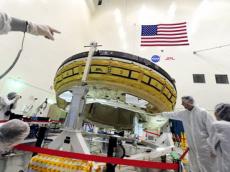|
|
TODAY.AZ / Weird / Interesting
NASA to test astronaut carrier “flying saucer”
21 May 2014 [09:55] - TODAY.AZ
 NASA approached establishment of transport communication between Earth and Mars. The space Agency will experience a flying saucer, which can deliver astronauts and cargo to the Red planet.
NASA approached establishment of transport communication between Earth and Mars. The space Agency will experience a flying saucer, which can deliver astronauts and cargo to the Red planet.The device will rise to 55 kilometers and will develop a speed, which is 3.5 times higher than the speed of sound. The experiment will take place in the first half of June 2014 at a missile range in the U.S. air force on the island of Kauai.
It really looks like a flying saucer” because of its shape disk. However, officially the device is called Aerodynamic inflatable moderator supersonic speed”. The design ideas, it will be attached to the base of space ships, to ensure their deceleration in the thin Martian atmosphere and a soft landing on the surface of Mars.
“These systems are designed to solve complex problems braking of vehicles when entering the Martian atmosphere, “explained NASA. – The inhibition should be sufficient to ensure that the device could deliver on the surface of the planet massive load without using additional amount of rocket fuel or heavy heat shield.
Currently, NASA has developed two such devices with a diameter of 6 and 8 metres, designed, respectively, for the space of “trucks” and manned spacecraft. The construction is equipped with a giant parachute diameter of 33.5 meters, which must also ensure a successful landing on Mars heavy loads, including accommodation modules and operated vehicles for the return of the crews on the Ground.
“During the upcoming test over the Pacific ocean drive, equipped with jet engines, inflatable moderated and parachute, will go at the same speed, and then to make the braking and landing, as it would ship in flight to Mars”, – quotes ITAR-TASS of a representative of the space Agency of the USA. NASA believe that this will happen due to the low density of the air in the earth’s stratosphere, which in this sense is close to the atmosphere of Mars.
During the test a flying saucer will raise up in a balloon to a height of 36 kilometers, where on command from the Earth will be turned on its rocket engines. Taking height of 55 kilometers, and at a speed, 3.5 times the speed of sound, it will start reducing using inflatable braking system and a parachute. Down it will have on the surface of the Pacific ocean, where staff NASA expects to find it with the help of American sailors.
/AzerTAc/
URL: http://www.today.az/news/interesting/133796.html
 Print version
Print version
Views: 2521
Connect with us. Get latest news and updates.
See Also
- 25 January 2026 [22:33]
Scientists solve 66 million-year-old mystery of how Earth’s greenhouse age ended - 20 January 2026 [14:34]
Spain train crash death toll rises to 41 after high-speed derailments - 19 February 2025 [22:20]
Visa and Mastercard can return to Russia, but with restrictions - 05 February 2025 [19:41]
Japan plans to negotiate with Trump to increase LNG imports from United States - 23 January 2025 [23:20]
Dubai once again named cleanest city in the world - 06 December 2024 [22:20]
Are scented candles harmful to health? - 23 November 2024 [14:11]
Magnitude 4.5 earthquake hits Azerbaijan's Lachin - 20 November 2024 [23:30]
Launch vehicle with prototype of Starship made its sixth test flight - 27 October 2024 [09:00]
Fuel prices expected to rise in Sweden - 24 October 2024 [19:14]
Turkiye strikes terror targets in Iraq and Syria
Most Popular
 Karma and Canada - what does separatism taste like?
Karma and Canada - what does separatism taste like?
 Armenian Billion-Dollar Fraud Scheme Exposed in Los Angeles
Armenian Billion-Dollar Fraud Scheme Exposed in Los Angeles
 Iranian government's plane reportedly lands in Moscow
Iranian government's plane reportedly lands in Moscow
 Paris marks demise of "Armenian question"
Paris marks demise of "Armenian question"
 President Ilham Aliyev receives credentials of newly appointed ambassador of Greece to Azerbaijan
President Ilham Aliyev receives credentials of newly appointed ambassador of Greece to Azerbaijan
 President Ilham Aliyev accepts credentials of Australia's newly appointed ambassador
President Ilham Aliyev accepts credentials of Australia's newly appointed ambassador
 Trump warns UK against deepening business ties with China
Trump warns UK against deepening business ties with China
